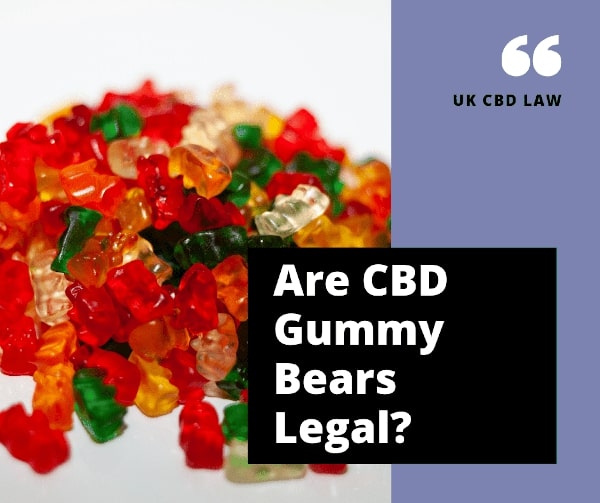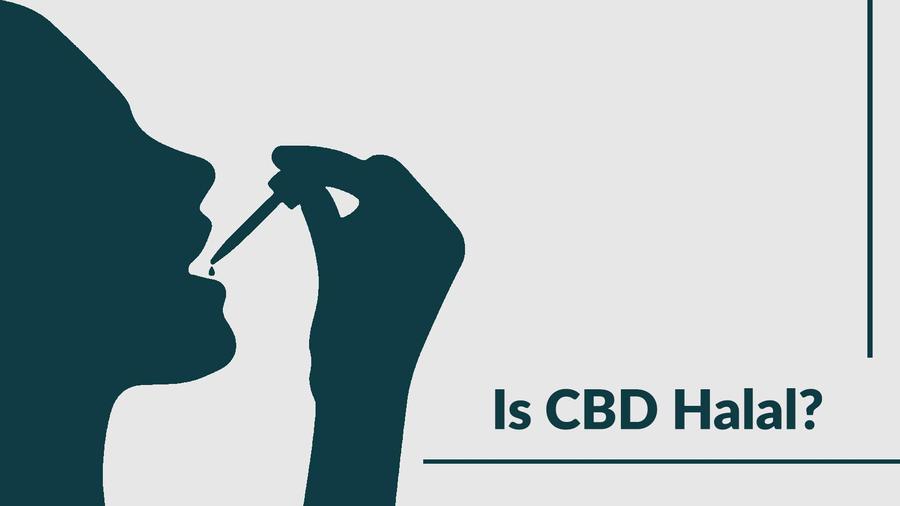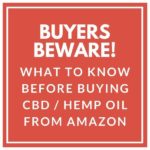
Is Hemp Oil on Amazon actually CBD? Should you buy Hemp Oil from Amazon? And what should you look for when buying CBD?
Amazon is one of the most trusted household names for online shopping globally. However, due to their marketing regulations and practices around selling CBD, they are one of the most unreliable and unsafe places to buy CBD oil online. This is a big statement to make but I seriously recommend you consider the points I raise before you buy CBD (Hemp Oil) from Amazon.
Full Disclosure: I run a competing online CBD re-selling Shop in the UK (BloomBotancis.co.uk). By observing the practises that sellers have to work around in the UK to sell CBD on Amazon, I feel it puts un-educated users in danger of being exploited and the transparency of the actual CBD contents in the products is dangerous and irresponsible and is overall bad for the CBD industry.
The Deliberate Loopholes of Selling CBD/Hemp Oil on Amazon
Wait, Amazon doesn’t have CBD sellers….
Well, it actually does.
Just search CBD and you will find over seven pages of ‘Hemp Drops/Hemp Oil/Hemp Vapes’ of sponsored and unsponsored listings coming up for the term ‘CBD’. However, these product listings will not list anything to do with CBD in their descriptions or titles. That is because they are listings made to dodge the ‘ban on CBD’, or at least the keyword ‘CBD’, that Amazon has in place to flag products. These are either genuine CBD products using this as a loophole or products that are definitely not CBD and are trying to trick uneducated and inexperienced people looking for CBD into buying it.
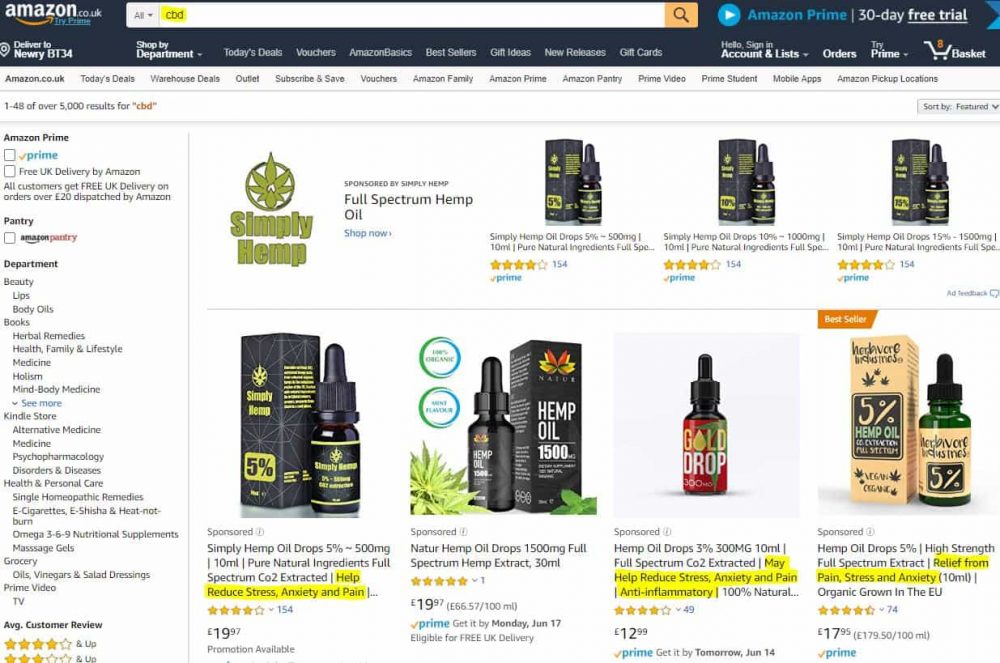
Many are breaking serious MHRA guidelines…
The Medicines & Healthcare products Regulatory Agency (MHRA) have strict sets of guidelines surrounding promoting health products in the UK. The forms of marketing MHRA consider suggesting to a consumer that a product is properly classified as a medicinal product are:
- references to medical conditions
- comparison with licensed medicines
- references to interference with the normal operation of a physiological function
- product names which refer to adverse medical conditions
- references to medical and/or clinical research and testing
- references to the health risks of not taking a particular product
- editorial medicinal claims
- recommendations by Doctors/health professionals
- testimonials that include/imply medicinal claims
- graphics that imply medicinal uses
- references to or reproduction of “generic” information
- juxtaposing with any examples of the above
- inclusion of details in an Ailments Section
This means that marketers should not do these things when marketing health products or food supplements. As it may deceive customers into thinking a food supplement is a serious medical treatment, and not approach trained medical professionals for help when it could be needed most.
So considering these points, we can see that a significant amount of these listings are making improper and quite extreme medical claims:
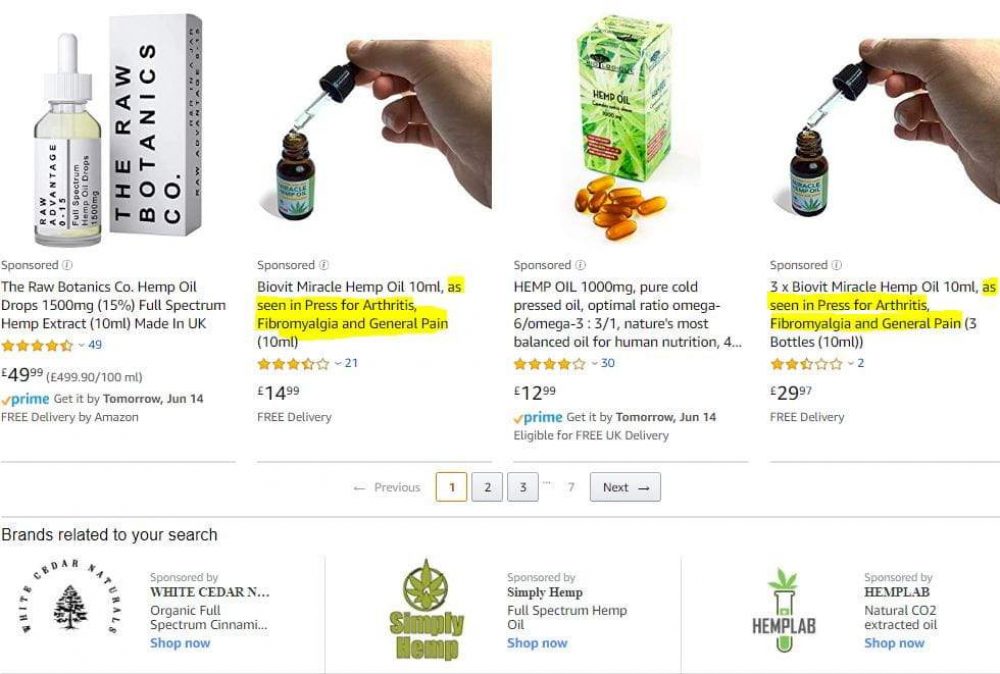
This shows that there are serious cases of false advertisements for these products. Which seriously break these regulations, here is one of the worst examples I have found in the product descriptions:
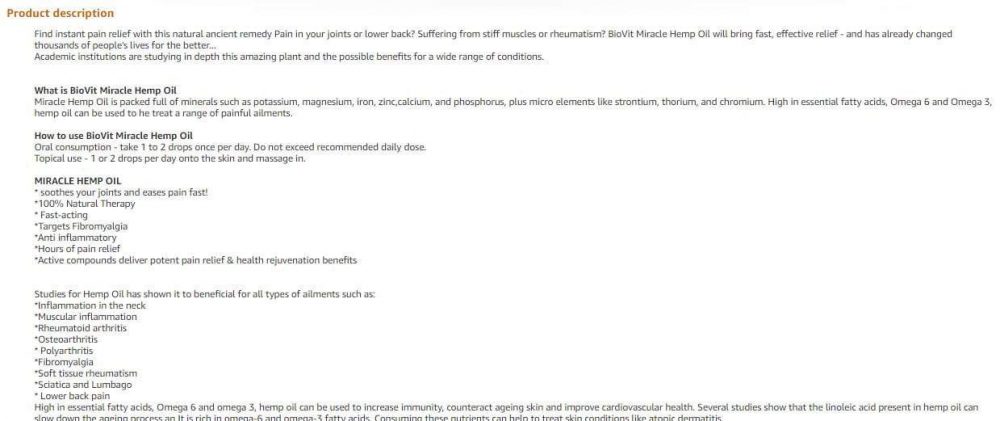
Basically, everything after and including ‘Miracle Hemp Oil’ breaks the MHRA’s guidelines
Amazon is a marketplace, they’re not to blame… It’s the sellers you should blame….
Yes, Amazon is just a marketplace, and the sellers themselves are the ones selling misleading products. However, Amazon has left the term ‘hemp oil’ open for use as a way for selling legitimate CBD, or illegitimate CBD products which contain little to no CBD at all; due to them literally being just hemp seed oil. There is little to no way to be sure if the brands are trustworthy or not without doing your own personal research off-site. Which I’m sure many, if not most, people using Amazon will not do.
So, overall, we can see that Amazon’s ban on CBD has generated a home for illegitimate or miss-labelled products specifically designed to game this gap on the Amazon marketplace. Which the majority of people will perceive as reliable CBD products, and they may actually be!! However, due to the ban on CBD, the user will not actually know what they really are buying.
Demystifying the Product Descriptions and the Risk of Deception They Have
What exactly are the problems with Amazon Hemp Oil (CBD) listings:
They use common CBD marketing talking points but don’t mention the CBD content. For example: if you purchased a 15% hemp oil, you don’t know:
- If that is percentage/ mg count, CBD content or hemp extract amount
- If it is hemp extracts, how much CBD is in that extract? All hemp extract is not created equally in quality or concentration of CBD.
Technically, a CBD Paste with 14% CBD content is a hemp extract and a CBD isolate of 99.9% is a hemp extract (as they are both extracted from hemp). But, some people may say that hemp seed oil is a hemp extract which has a 0% CBD content. This alone creates a huge margin in error for the strengths of CBD content. Which is exactly what the purchasers of these products are looking for. So consumers looking for 15% CBD oil, will buy this and end up with anywhere from 0% to 15% depending on what they buy.
I feel this product is a good example of something which is actually CBD:
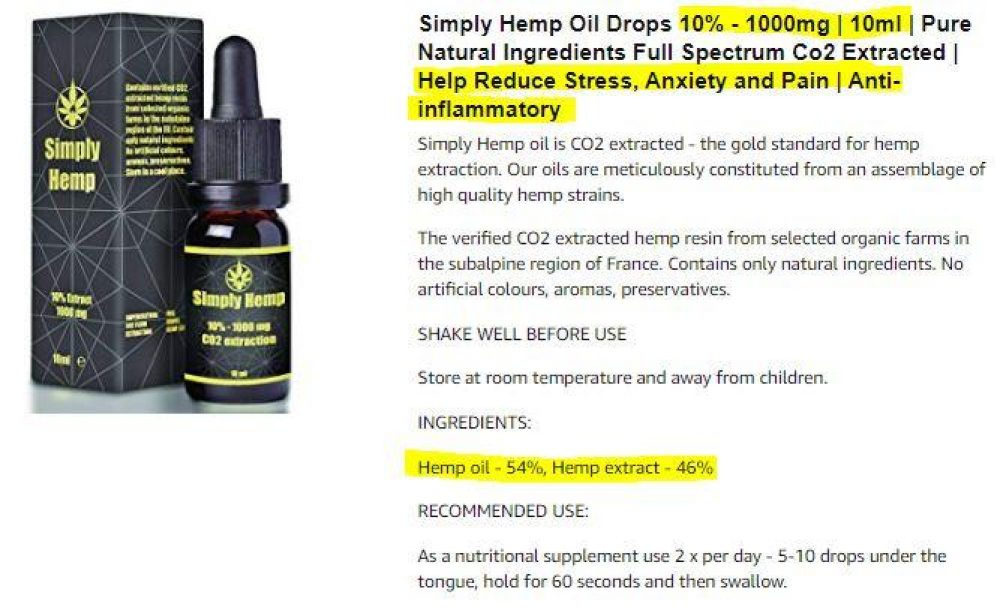
Is it 10% (1000mg) CBD or hemp extract? Well, it says that it is 46% hemp extract in the description. Which means that 4.6ml is hemp extract which is more than 1000mg so it actually can’t be that.
So they must be referring to CBD. Which means in this case the hemp extract is 21.74% CBD. So this product is most likely correctly showing its CBD content. But the listing is not saying it is 10% CBD. So, realistically, it could have literally nothing in it in regards to CBD.
However, due to the ban on ‘CBD’ as a keyword, there is no chance of finding a lab report for this product on Amazon, so we can’t be sure it’s reliable. And I can’t find this company online anywhere under its brand name or trace 3rd party lab reports on these products on or off of Amazon. which just throws up more red flags.
Next, a good example of something which is really just Hemp Oil, but coming up when I search CBD which will deceive those who don’t know or are new to CBD:
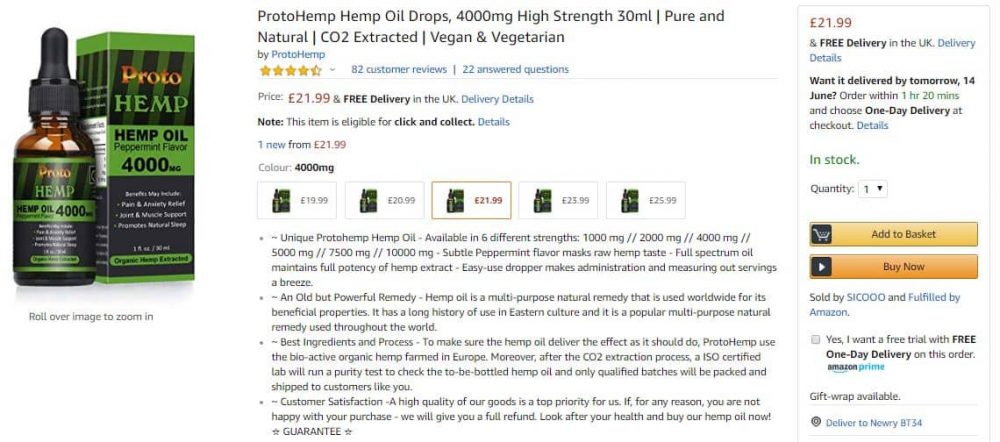
CBD is a quite pricey product so this product may look appealing to someone who doesn’t want to spend a lot on CBD. But it has 4000mg strength… strength of what? CBD or Hemp extract. Given the price, I would expect maybe that is the mass of hemp extract, but very weak hemp extract, with little to no CBD. So this again is strongly misleading customers. As 4000mg of CBD in 10ml of an oil carrier goes for around £270. Below is an example of a legitimate 4000mg CBD Oil bottle.
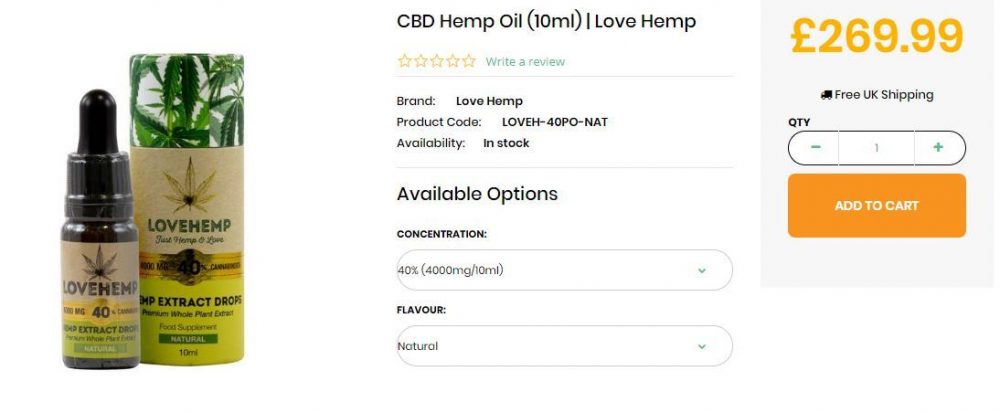
Why I Think Amazon Is Allowing CBD to Sold On Its Site Like This
Basically, so they can force any product related problems onto the sellers. Amazon has ‘banned CBD’ – ‘This product is miss-sold hemp oil and flew under our radar.’ This allows them to ban the sellers as they are the ‘bad people’. Saying that they did nothing wrong, and this is people exploiting the system.
How can we tell Amazon has properly assessed these products and should be aware of what they are?
In Amazon you can only have pictures in your description if Amazon has specifically given your brand the go-ahead to do so, this is for large sellers they trust. This means that these brands and products have been manually reviewed and approved by Amazon staff for extra detailed listings for something which is clearly CBD. For Example, this product description even talks about the CBI & CBII receptors, something which is fundamental to the interaction your body has with CBD.
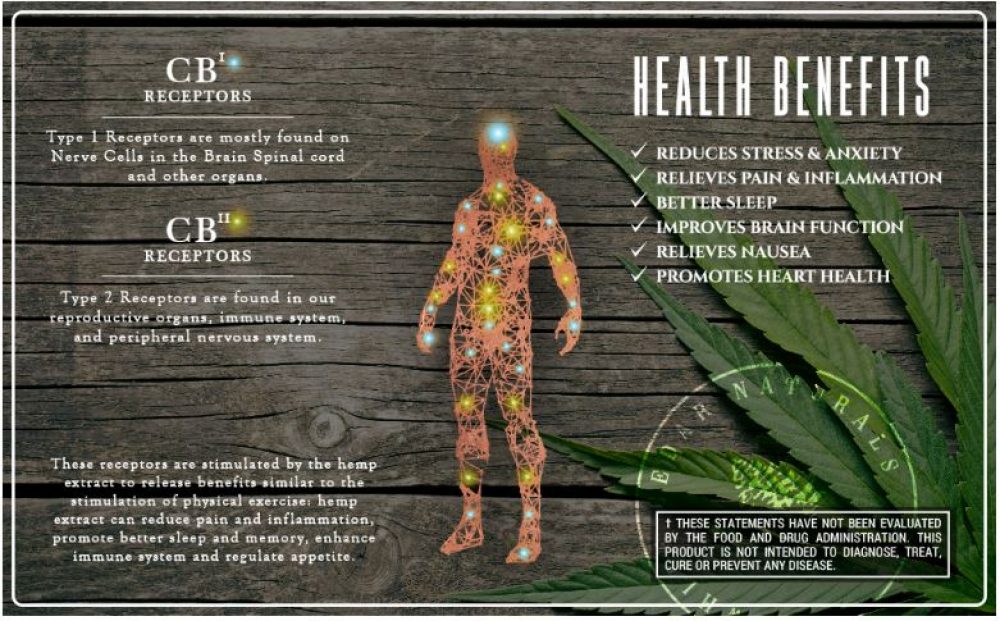
If we look at the main heading of the product, we see outlandish claims to health benefits which breach MHRA standards, and indications and strengths which make this appear to be a CBD product.
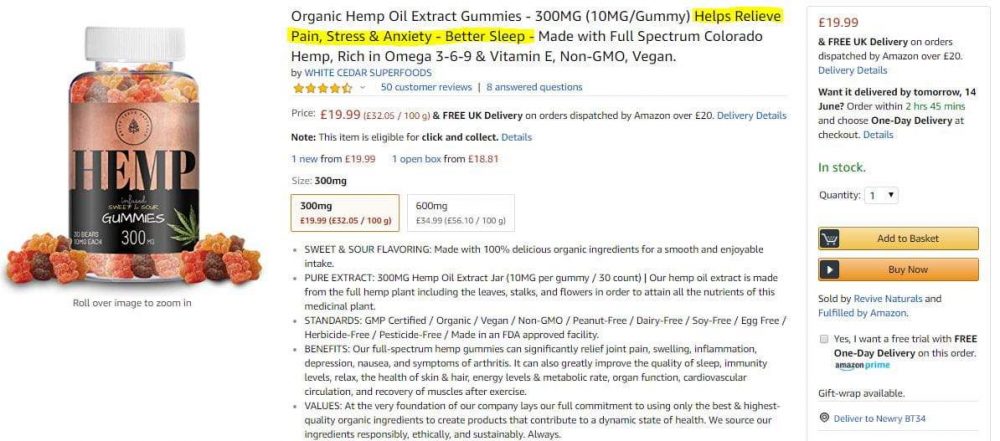
Alot of these products have been sold on amazon so they have been there quite some time.
The review rate of buyers on amazon is 2-5%, this means that some of these products have moved anywhere from 3000-6000 units. So I think its easy to say that these have been exploiting this loophole on amazon for a while.
What I Think Amazon Should Do
Amazon should allow full transparent sales of CBD on their platform, and push for lab tested products to at least ensure they respect UK CBD laws. This will also educate and let CBD users buy CBD in a safe manner so they can actually know what they are buying. Currently, they have just created an unreliable environment that will lead to their customers buying a low-quality product which may not even contain CBD; or buying CBD products while being unaware of the safety and legality of the product.
Alternatively, they shouldn’t be selling these products and nothing should appear when I search ‘CBD’ on Amazon. As it is misleading their customers and do a disservice to their customers and the CBD industry.
Must Read: UK CBD Law – An In-depth Analysis
What You should look out for when buying CBD
- Buy CBD which clearly states that it is CBD and it’s CBD content.
- You Should buy CBD which has been 3rd party lab tested to ensure:
- It’s legal in the UK (contains under 0.2% THC)
- It’s made to professional standards.
- It actually contains the CBD that the brand claims
- Additionally, the more open the brand is about their lab reports the more you can trust them.
- Buy from brands which use pesticide and herbicide free hemp.
- Research 3rd party reviews of the products you’re interested in, I find youtube is a great resource for this. It’s easier to tell who’s been paid to talk about it, and who is doing a genuine review.
At CBD Scanner we work hard to be as transparent about the products we review as possible providing all the information we can. This is to help you understand what you’re putting in your body, while being able to be sure of the exact CBD.




